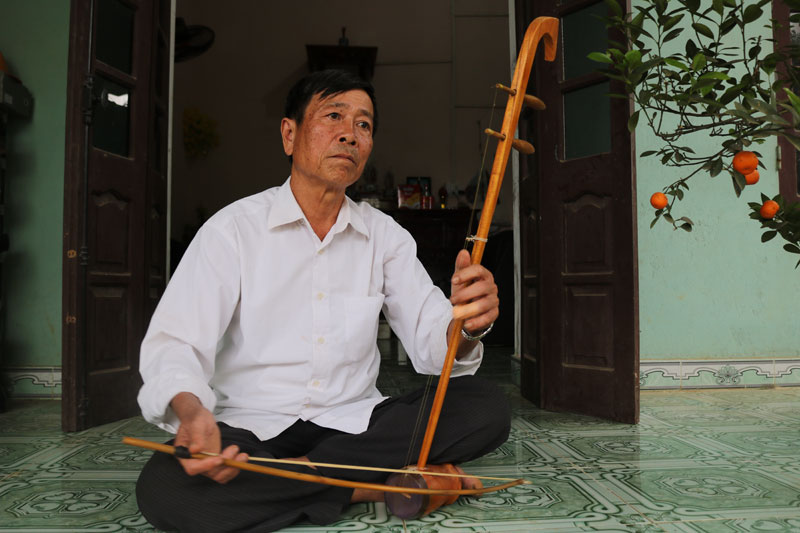
(HBO) - At the end of the winding road of the village is the home of Mr. Bui Van Eu, Lam village, Phong Phu commune, Tan Lac district. Having known about Doi singing at the age of 13, up to now, he is 67 years old and always trying to preserve the ancient cultural values of the Doi singing.

Mr. Bui Van Eu passionately practicing with
his favorite musical instrument.
Mr. Eu has known about Doi singing since he
was 13 years old; he knew how to play musical instrument at the age of 16. He
was very passionate about singing in his childhood. At first, he just liked
going to the theater and watching the singing performances. The more he watched
Doi singing, the more passionate and interested he became. Finally, he decided
to study singing from previous generations. Since then, he gained a better
understanding of the role of Doi singing in spiritual life and he had a desire
to store and preserve the integrity of its traditional cultural values.
At present, he continues to teach the younger
generations. His free ethnic musical instrument class includes nine people aged
from 20-40. These learners were all in the village, and he discovered their
musical talents. It was called as a class, but actually, only those who are
passionate focused on his house and he guides what he knows. The class had no
books and no lesson plans, all the rhythms and performances were recorded
deeply in his memory.
From the day he knew Doi singing, remembering
the most memorable memories, Mr. Eu exclaimed enthusiastically: "When I
was young, still single, I often participated in the Doi singing competition in
the village and commune. Once I sang in a competition with a girl in My Hoa for
3 nights with all the subjects required by the judges but could not defeated,
at last I got lost because she was extremely talented. When we started singing,
we were so far from each other.We sang until we got close to each other,
standing in front of each other, and then I found out that the girl hid a
notebook recording the lyrics at her back. For many years, I really want to see
her again for a Doi singing competition but unfortunately, she passed away.”
Mr. Eu
used to be the person who hit three gongs in the opening of Muong Bi Festival;
to be a judge at the Doi singing contests and the ethnic musical instrument
contest in the opening of the Festival; participating in culture and art of
ethnic minorities in the northern mountainous provinces and performing arts
exchange in the commune and district.
In the near future, he hopes to open singing
classes for the people in the village. These open-door classes welcome Doi
singing lovers and expect to learn about the ethnic music.
"I was discussing with the Commune
Farmers Association, I would like to open another class next month, I need to
teach the next generation what I know, if not, it might be faded by time. I
hope that Doi singing will attract more and more people to love and learn
especially young people. If we together protect and preserve, I believe we will
do, "- Mr. Eu said.
Phong Phu commune, Tan Lac district of Hoa Binh province, is widely regarded as the cultural heartland of the Muong ethnic group. Among its many traditional communities, Luy Ai hamlet (formerly Ai hamlet) stands out as a rare location where the customs and way of life of the Muong Bi people remain largely intact.
The Truong Kha temple festival, a distinctive cultural event held every three years in Vu Ban township, Lac Son district, returned recently with vibrant rituals and folk traditions of the Muong people. Located next to the Buoi River in the Muong Trao fields, the Truong Kha Temple is dedicated to the three Kun Dol deities, revered for teaching farming techniques, irrigation, weaving, and protecting the harvest.
The demand for spaces serving community activities of residents in various areas across Hoa Binh city has been satisfied as local cultural houses now feature modern, spacious facilities thanks to the effective implementation of Resolution No. 49/NQ-HDND issued on December 28, 2021 by the city People's Council, which approved the plan for reorganising, converting, and allocating land for the construction, repair, and expansion of cultural houses in Hoa Binh’s villages and residential areas until 2025.
At the end of May, the Hoa Binh Provincial Ethnic Arts Troupe organized a series of performances for residents in Region 2 and Region 3 communes across the province. Bringing art to ethnic communities in remote, isolated, and especially disadvantaged areas has become a meaningful activity. These are not merely artistic performances but also journeys to disseminate cultural values, enrich spiritual life, and contribute to preserving the cultural identity of ethnic minorities.



